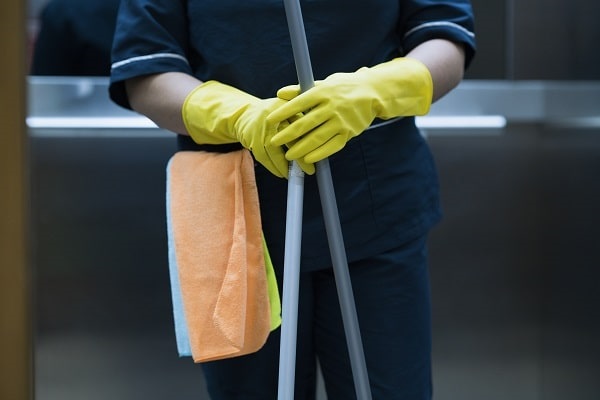Companies of all sizes rely on janitorial or cleaning crews to keep workplaces clean, orderly and, perhaps most importantly, properly disinfected and sanitized. Typical duties include mopping floors, wiping down surfaces, removing trash, cleaning carpets and so on. Some janitorial companies even help with minor repairs and maintaining some of the building’s exterior features, like sidewalks and walkways.
The coronavirus pandemic continues to evolve throughout the United States. Initially, the outbreak resulted in an escalated demand to clean and disinfect all public spaces, from retail centers and schools to office buildings and warehouses. This demand leads to increased risks facing the workers on the front lines: the janitors and cleaning crews.

Coronavirus Risks Facing Cleaning and Janitorial Crews
There’s no doubt that
COVID-19 is a threat to public health. Across the country, millions of people have been asked to shelter in place and governors are issuing stay-at-home orders to prevent the spread of the coronavirus. However, essential employees like healthcare staff, first responders, grocery store workers and the cleaning staff who keep these workplaces clean and sanitized are still reporting for duty every day, despite the risks they may face.
Janitorial and cleaning staff are considered to be on the front lines of the COVID-19 pandemic. Many teams are now responsible for deep cleaning and sanitizing surfaces and areas that have been infected with the coronavirus. Additionally, these workers handle potentially dangerous chemicals and remove trash and other waste that could be contaminated.

To help prevent the spread of COVID-19, cleaning workers are also being provided with new, stronger cleansing agents and chemicals that may compromise their own health. For instance, there have been
reports about cleaning staff being required to use a product called Virex, a powerful disinfectant and cleaner that complies with OSHA’s standards for bloodborne pathogens. It is also known to cause skin irritation like rashes and burns. Additionally, due to equipment shortages, many workers are not being provided the proper personal protective equipment (PPE), such as gloves, eye protection or respirators.

The Importance of Protecting Workers During the Coronavirus Pandemic
The health and safety of the janitors and cleaning crews responsible for keeping workplaces disinfected and safe during these difficult times is, of course, of utmost importance. However, there’s another issue at hand, too: the treatment of these essential employees in regards to pay, sick leave and vacation time.
These workers tend to have fewer benefits that could help them get through the shutdown caused by the COVID-19 pandemic. Janitors and cleaning staff are generally in a lower salary tier, and
data from the Bureau of Labor Statistics (BLS) reveals that only 51% of workers in this tier say they get paid sick leave. They do not have the option to
work remotely, which means they are heading into the very locations others may be vacating to work from home.
The good news is the largest economic stimulus package in history,
the CARES Act, was signed into law by President Trump on March 27. This $2 trillion emergency aid bill will deliver much-needed relief to workers and businesses negatively impacted by the COVID-19 crisis. With $250 billion in unemployment insurance benefits, workers who have been laid off can receive enhanced benefits such as an additional $600 per week for four months, and benefits lasting for 39 weeks as opposed to 26.

There are also controls employers can implement to help ensure the health and safety of their staff and decrease the risk of infection. OSHA created
guidelines for preparing workplaces for COVID-19 that includes basic infection prevention measures, such as promoting frequent hand washing, urging workers to stay home if they’re feeling ill, and encouraging proper respiratory etiquette, like covering noses and mouths when sneezing or coughing. Conducting regular, formal job hazard assessments, enhancing HAZCOM and bloodborne pathogen (BBP) training, and reviewing, revising and expanding work safety practices can also help keep employees on the front lines safer.
AmTrust is Here for Our Small Business Insureds
AmTrust offers our support to our small business policyholders as well as our appointed agents during these uncertain times. We’ve created a
library of resources regarding the coronavirus to help you stay informed, safe and healthy. For more information about our
small business insurance solutions, please
contact us today.
 This material is for informational purposes only and is not legal or business advice. Neither AmTrust Financial Services, Inc. nor any of its subsidiaries or affiliates represents or warrants that the information contained herein is appropriate or suitable for any specific business or legal purpose. Readers seeking resolution of specific questions should consult their business and/or legal advisors. Coverages may vary by location. Contact your local RSM for more information.
This material is for informational purposes only and is not legal or business advice. Neither AmTrust Financial Services, Inc. nor any of its subsidiaries or affiliates represents or warrants that the information contained herein is appropriate or suitable for any specific business or legal purpose. Readers seeking resolution of specific questions should consult their business and/or legal advisors. Coverages may vary by location. Contact your local RSM for more information.